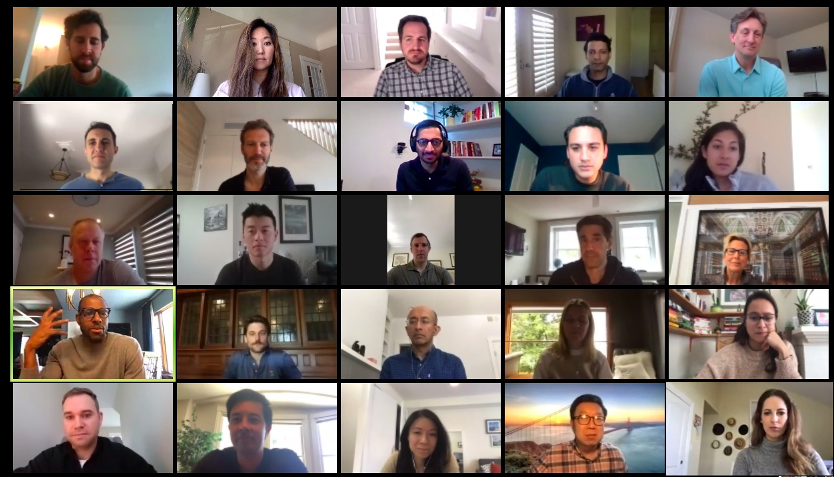
By Andre Iguodala, Venture Partner at Comcast Ventures’ Catalyst Fund
On March 11, I didn’t even have a chance to get out of my uniform, before hearing the basketball season was suspended. Within hours, I was coordinating travel to be with my family, learning how to set up teammates for remote conditioning, and working with fellow investors at Comcast Ventures as we assessed how to help our portfolio companies respond to the COVID-19 crisis. Over the next several weeks, I’ve been able to experience what it takes to keep high-performance teams motivated. It’s about fostering the right culture of camaraderie and embracing the process, which starts with being in the right state of mind.
Mindfulness From the Very Start
Right now, most “high performers” are concerned with the uncertainty of their future — not being able to predict wins or losses regardless of how highly skilled they are. During this time, the only thing we can control is ourselves, more specifically our state of mind. It drives everything around us, including our home environment, digital interactions, and decisions. So much of our stress comes from wanting this moment to be something other than what it is, instead of just embracing it for exactly what it is. By instituting daily practices to solidify a mindful approach, we will all be clear-headed and ready to perform when it’s game time again and businesses around the globe start to open back up.
My team holds Zoom workouts five days a week. At the beginning of each session, we meditate for five minutes to become centered. We acknowledge and appreciate the opportunity of simply being there, and we set the mood. Through deep breaths, we calm our minds and bring back focus. Our virtual workouts are a mix of pilates, yoga, biking, and other drills. Even though we are not physically together, we are all alert and connected.
Our present reality draws similarities to a team facing tough times. Think of a team midway through a season with wins that are few and far between. The team has to muster up the mental fortitude to accept that another loss may be inevitable. And yet, you must continue to show up. So you ask yourself, how does one stay motivated and upbeat through turmoil? I’ve been in this situation more than once in my career, and as I look back I’m actually thankful for the insight I gained through those tough times. Here’s what I learned and what I’m doing today:
If losing is still what ends up being the outcome, then so be it. With the appropriate mental framework, a loss isn’t a loss, it’s a lesson.
Culture of Winning and Camaraderie
The thing players who retire or leave the game miss the most is camaraderie. They miss their teams, the shared bus rides, the grueling practices. During the COVID-19 shutdowns, digital businesses can carry on with remote work, but that’s not the same for professional athletic teams — we require physical proximity. The restrictions are forcing us to come up with creative ways to build a strong remote team culture and camaraderie. It starts with structure and a routine where everyone’s individual circumstance is taken into consideration.
Some of our players didn’t have home workout gear or hoops at home. We had to make sure everyone could participate in virtual workouts, sending weights, bands, and even basketball hoops out to players. At the same time every day, no matter the time zone, we are all committed to joining a virtual workout where we see each other on video. We challenge each other, talk a bit of smack as we would in person, and stay engaged as a team. Even without the physical courts, “work” remains a place of fierce competitive passion. We continue to work with the same fire and intention to win. I see this with hospitals and healthcare workers. I see this in many startups and neighborhood small businesses determined to make it through.
Managers of high performing teams need to ask themselves –
The Warriors were a prime example of what foundational culture can achieve. All the top talent wanted the opportunity to be a part of that culture because, in the end, we all want to do what we love to do and be rewarded for it. The culture we built allowed us to withstand the toughest times.
Play the Long Game and Enjoy the Process
Business people are used to operating in environments where they get feedback and results quickly, especially in tech. Milestones, product launches, winning customer deals… growth happens on a quarterly cadence, if not monthly, and under the scrutiny of customers, investors, and advisors. But, sports are not like that. It’s a grind. Success takes years. Nobody turns around a team that is in the midst of a crisis in two quarters. Kobe would say that all he focused on was the process. There are so many debates about how and when the world will recover from the impacts of the pandemic — it’s going to be a grind — we all need to find the motivation and vision to play the long game here and even joy in the process that lies ahead.
A key part of making progress is in setting forth a plan. Use this ‘break’ in routine to find balance and assess what’s important in life. It’s interesting to see how my fellow athletes are thinking differently about their lives and about their future. They are adjusting financially and taking this time to learn how the business of basketball works. They are thinking about management and investing. They are learning about different sectors beyond the game including media, technology, real estate, and more. Many players don’t think about life outside of basketball until later in their careers. The COVID-19 ‘break’ from the game is forcing players to think about other interests, strengths, and opportunities. I’m working on this myself. I have 2 kids in the house, I create a schedule where I am with the kids for a couple of hours, and then focus on basketball and training while making sure I join meetings with the investing team at Comcast Ventures, where I serve as a Venture Partner on the Catalyst Fund.

The days can feel never-ending as they blend into each other. Do what you need to do in order to internalize this process. One of the things that really helps me adapt is journaling. I put pen to paper, which I haven’t done since college — I know I’m dating myself — but writing helps me focus on a pattern of activity to reach short and long term goals over time.
Being a professional athlete, one quickly accepts the fact that tough times are the norm. Media scrutiny, egos, team continuity, personal identity (at the end of one’s career) — all play a role in the constant battle of finding true mental and physical balance. The current COVID-19 pandemic is forcing us to compete harder than many of us ever have — not toward an end score, but for that balance that builds strength as individuals and as high performing teams.

On April 16th, Comcast Ventures’ Forecast Labs held a Town Hall for our founders. The recording of “Keeping High-Performance Teams Motivated During the COVID-19 Recovery” is now available on the Forecast Labs content page.
Players on Pause: How to Keep High-Performance Teams Motivated was originally published in The Forecast on Medium, where people are continuing the conversation by highlighting and responding to this story.
© 2025 Comcast Ventures Terms of Service Privacy Policy Do Not Sell My Personal Information.